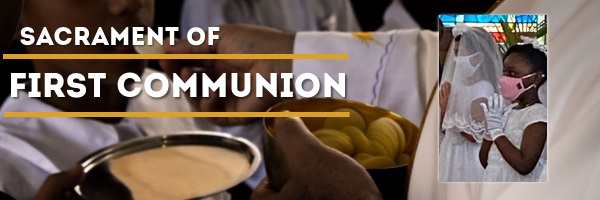
As Catholics, we believe Christ, His body, blood, soul and divinity, are really and truly present under the appearance of bread and wine, in the Eucharist. After consecration, it is no longer bread, and no longer wine, but the substance of Christ’s body and blood. In the Catechism f the Catholic Church (1413) it states ‘by the consecration the transubstantiation of the bread and wine into the Body and Blood of Christ is brought about. Under the consecrated species of bread and wine Christ himself, living and glorious, is present in a true, real, and substantial manner: his Body and his Blood, with his soul and his divinity (cf. Council of Trent: DS 1640; 1651).
The sacrament in which the faithful, in a state of grace, receive the true Body, Blood, Soul, and Divinity of Jesus Christ who is really and substantially present under the appearances of bread and wine is called the Eucharist. The word Eucharist means ‘thanksgiving’. At the Last Supper, the Eucharist was instituted when Jesus ‘gave thanks’ and broke bread with His disciples and said ‘Do this in memory of me’.
When we receive the Eucharist, we refer to the Sacrament as Holy Communion. It is the most central part of the Mass. The Eucharist is the supreme act of the baptized Christian's gratitude to God, and it is the only Sacrament that is considered both part of initiation and healing. It is also a source of strength and grace we can receive not just on Sundays, but daily. Our loving faith community welcomes you to be a part of the Mass here at Mary Help of Christians Parish where we celebrate the Mass and Eucharist daily.
First Holy Communion
First Holy Communion is one of the three sacraments of initiation. It is through these sacraments that we become full members of the Church. We receive the Eucharist for the first time during the First Holy Communion. Children receive First Holy Communion when they are around 7 years old and have already been enrolled in Faith Formation classes, and Sacrament Preparation. Adults receive Communion for the first time after completing the RCIA program.
Guidelines for Communion
For Catholics:
The National Conference of Catholic Bishops offers the following for practicing Catholics: “In order to be properly disposed to receive Communion, communicants should not be conscious of grave sin, have fasted for an hour, and seek to live in charity and love with their neighbors. Persons conscious of grave (mortal) sin must first be reconciled with God and the Church through the Sacrament of Penance (Confession).
For our fellow Christians:
We welcome you to the celebration of the Eucharist as fellow followers of Christ. For practical purposes, non-Catholics are excluded from reception of communion at a Catholic Church. The National Conference of Catholic Bishops says: “Reception of the Eucharist by Christians not fully united with us would imply a oneness which does not yet exist, and for which we must all pray.”
For those not receiving Communion:
Those unable to receive communion may simply stay seated or if you wish, you may come forward to the celebrant for a blessing. (If coming forward, please indicate you wish to have a blessing by crossing your arms over your chest with your hands on shoulders.)